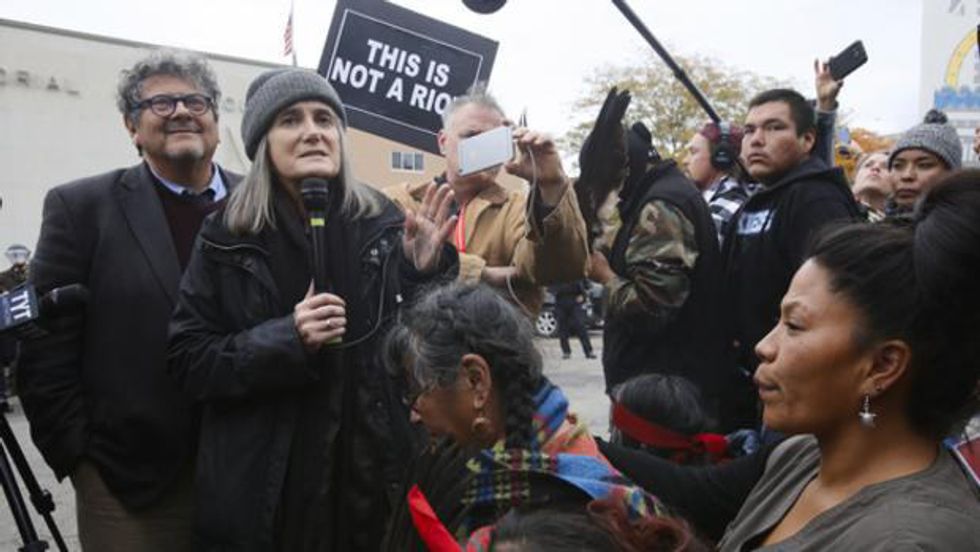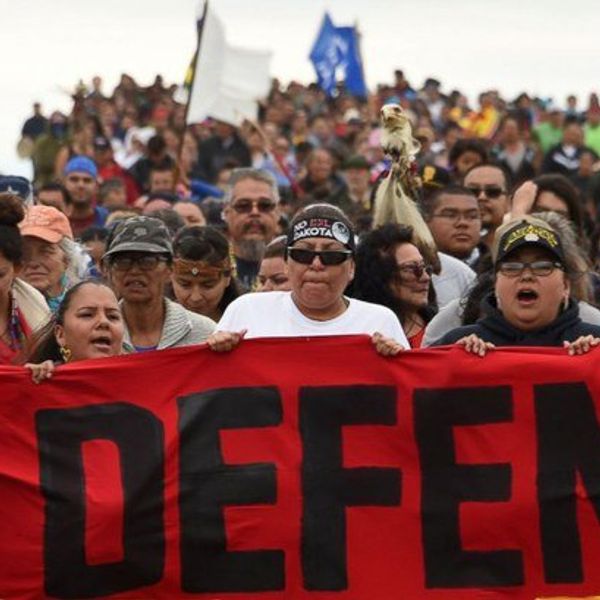For Democracy Now! reporter Amy Goodman, the last month has tested not only her work as a journalist but also the very core of the First Amendment itself. It all began last when month when Goodman endeavored to document and report the protests of thousands of Native Americans against the Dakota Access Pipeline, a 1,172-mile long pipeline that is planned to transport 470,000 barrels of crude oil per day from the oil-rich Bakken Formation in North Dakota to South Dakota, Iowa and Illinois.
For months, protesters have voiced environmental concerns that the pipeline will damage significant parts of their Native American tribal lands, particularly the Standing Rock Sioux Tribe, whose reservation lies directly near the pipeline route. The Standing Rock Sioux Tribe has been joined by members of nearly 100 more tribes nationwide, as well as from tribes in neighboring Canada. Their main concern is that if the pipeline leaks, the $3.8 billion pipeline will pollute the fresh-water supply for millions of people.
Goodman began her coverage to what she donned as the “the standoff at Standing Rock” on the morning of September 3. In the 7-minute video of Goodman released exclusively by Democracy Now!, Goodman can be seen standing on the main protest site documenting hundreds of protesters attempting to stop bulldozers from digging into the earth. The protestors, however, were viciously met with pepper spray and attack dogs that quickly turned the scene into a dusty match between the private security contractors and the attacked protestors.
Days later, Goodman released her report, “Dakota Access Pipeline Co. Attacks Native Americans with Dogs and Pepper Spray,” which created an uproar surrounding the protests from media outlets that were silent on the issue before Goodman's report.
Five days after protest on September 8, Goodman became aware that Morton County, North Dakota has issued a warrant for her arrest. She was initially charged with criminal trespassing but that was later dropped and replaced by a new charge of riot, a misdemeanor punishable by a fine and jail-time if found guilty. Why the change? It appeared prosecutor Ladd Erickson was having legal issues with his initial charge due to a trespassing statute.
The real issue, however, was the infringement upon Goodman's First Amendment right to freedom of the press. Goodman was not alone in her fight for free press, as 200 people rallied in front of the Morton County courthouse on October 17, the day of Goodman's arraignment, demanding the charges to be dropped.
District Court Judge John Grinsteiner dropped the charge, ruling that there was no probable cause for the riot charge. Goodman stood before the courthouse and said: “The judge’s decision to reject the State’s Attorney Ladd Erickson’s attempt to prosecute a journalist—in this case, me—is a great vindication of the First Amendment.”

According to Democracy Now!, Goodman continued, "This is a complete vindication of my right as a journalist to cover the attack on the protesters, and of the public's right to know what is happening with the Dakota Access pipeline. We will continue to report on this epic struggle of Native Americans and their non-Native allies taking on the fossil fuel industry and an increasingly militarized police in this time when climate change threatens the planet."
The fight to protect the pipeline lands as well as First Amendment rights are not over. This past Saturday, October 22, 83 people were arrested during another protest against the pipeline construction. According to the Morton County Sheriff's Department, 300 protesters trespassed on private property and "engaged in escalated unlawful tactics and behavior." Shadowing Goodman's charges, the 83 protestors were charged with criminal trespass and engaging in a riot. Many others, including actress Shailene Woodley of the "Divergent" movie series, were arrested in prior protests against the pipeline.
Among the concern for the lands surrounding the pipeline and the millions of lives it has the potential to negatively effect is the underlying issue of protecting our First Amendment rights. Incidents such as these should make us question how far our faith in one of America's founding principles should be tested before it is infringed upon and taken away from us as journalists, protestors or simply humans.





















